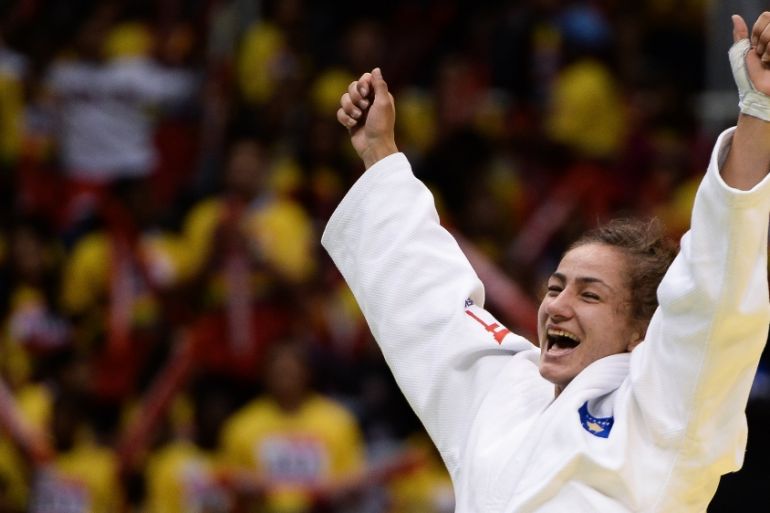Kosovo’s Olympic dream taking shape
The IOC recognised Kosovo as an independent state and has allowed athletes to represent it at Rio 2016.

Pierre de Coubertin once said: “The Olympic spirit is neither the property of one race nor of one age”.
The saying aptly fits 75-year-old Ali Pllana, president of the Shooting Sport Federation of Kosovo (SSFK). A four-time shooting champion of what used to be Yugoslavia, Pllana never got to compete at the Olympics.
Keep reading
list of 4 itemsIndonesia’s Christie takes Asia badminton crown ahead of Paris Olympics
Akebono, sumo’s first foreign-born grand champion, dies aged 54
Track and field becomes first sport to pay prize money at Olympics
“Prior to the success one had achieved in the field, ancestry, family and political views were considered,” recalled the Economics graduate Pllana who dedicated more than five decades of his life to the sport. Aged six, Pllana lost his father who was killed by Yugoslavian army and his 18-year-old brother was jailed.
![Pllana created the shooting federation after the war ended in 1999 [Rozafa Kelmendi/Al Jazeera]](/wp-content/uploads/2015/03/576acd44f4714aa6be7e2643c94c0365_19.jpeg)
After the 1981 demonstrations by Kosovo Albanians in Prishtina, the capital of then Socialist Autonomous Province of Kosovo, sports suffered greatly.
In 1989, the Shooters Federation ceased to exist and the Yugoslavian army forced them to give up all the equipment. They also confiscated Pllana’s private collection of weapons, among them rare exemplars and gifts from leaders of the time.
Two years later, shooting activities stopped in Kosovo. In the same year, Kosovo athletes quit racing in Yugoslavia and were not allowed to represent their native country internationally.
Kosovo hit the international headlines in 1999 when forces under Yugoslav President Slobodan Milosevic attempted to suppress the ethnic Albanian majority’s independence campaign that has cost the lives of more than 13,000 people.
Pllana was the target of a sniper attack as he was entering his house in Prishtina . A stroke of luck saved him, leaving him wounded. The attack made him stronger.
Soon after the end of the war in 1999, when Kosovo was liberated from Serbia, Pllana reformed the shooting federation.
He felt this ‘obligation’ to his country, to give direction to the new generations. After applying for membership at ISSF, Pllana spent most of his time in the office, working towards an international recognition for KSSF.
He had no staff, but just a few volunteers.
“To represent Kosovo at the Olympics was something I’ve dreamed for myself,” said Pllana before adding that the sport, at times, took preference over family. “Unfortunately, it didn’t come true for political reasons.”
Judo benefitting
Prior to the success one had achieved in the field, ancestry, family and political views were considered
The green signal from the IOC also came as welcome news for the judo coach Driton Kuka, who was a potential candidate for an Olympics slot until his dreams were crushed by politics too.
“My career was over when it was supposed to start, at the age of 20,” Kuka said.
For 24 years, Kosovo has generations of athletes, but now Kuka feels satisfied, since ‘everyone can see that under the Kosovo sky, rare talent is born’.
Judoka Majlinda Kelmendi celebrated a stellar year and was announced the winner of 2014 Prestige world ranking list by International Judo Federation. She was born in 1991, the same year sports isolation began in Kosovo.
According to Kuka, Kelmendi’s results and performance were key to Kosovo’s acceptance by the IOC.
The fight
Kelmendi started judo practice at her hometown Peja in 1999. The sports hall where she trained was built by the trainer’s family and had survived the war. It was even used as a shelter by Kuka’s family since their houses were destroyed.
Apart from throwing opponents throughout her career, Kelmendi had to break through barriers formed by international politics that had blocked her way to compete in international competitions for her country.
Even though she achieved the required scores for the Olympics, Kelmendi was not allowed to represent Kosovo at London 2012. Instead, she was chosen to represent Albania.
But now Kosovo’s flag bearer is very pleased with the fact that her success has brought international recognition and believes that Kosovo athletes deserve it.
As Rio 2016 approaches, Kelmendi is stuck between feeling proud and afraid – the huge responsibility to make the nation proud as it makes history as the athletes carry the Olympic dreams of 24 generations.